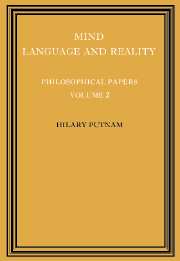Book contents
- Frontmatter
- Contents
- Dedication
- Introduction
- 1 Language and philosophy
- 2 The analytic and the synthetic
- 3 Do true assertions correspond to reality?
- 4 Some issues in the theory of grammar
- 5 The ‘innateness hypothesis’ and explanatory models in linguistics
- 6 How not to talk about meaning
- 7 Review ofThe concept of a person
- 8 Is semantics possible?
- 9 The refutation of conventionalism
- 10 Reply to Gerald Massey
- 11 Explanation and reference
- 12 The meaning of ‘meaning’
- 13 Language and reality
- 14 Philosophy and our mental life
- 15 Dreaming and ‘depth grammar’
- 16 Brains and behavior
- 17 Other minds
- 18 Minds and machines
- 19 Robots: machines or artificially created life?
- 20 The mental life of some machines
- 21 The nature of mental states
- 22 Logical positivism and the philosophy of mind
- Bibliography
- Index
8 - Is semantics possible?
Published online by Cambridge University Press: 12 January 2010
- Frontmatter
- Contents
- Dedication
- Introduction
- 1 Language and philosophy
- 2 The analytic and the synthetic
- 3 Do true assertions correspond to reality?
- 4 Some issues in the theory of grammar
- 5 The ‘innateness hypothesis’ and explanatory models in linguistics
- 6 How not to talk about meaning
- 7 Review ofThe concept of a person
- 8 Is semantics possible?
- 9 The refutation of conventionalism
- 10 Reply to Gerald Massey
- 11 Explanation and reference
- 12 The meaning of ‘meaning’
- 13 Language and reality
- 14 Philosophy and our mental life
- 15 Dreaming and ‘depth grammar’
- 16 Brains and behavior
- 17 Other minds
- 18 Minds and machines
- 19 Robots: machines or artificially created life?
- 20 The mental life of some machines
- 21 The nature of mental states
- 22 Logical positivism and the philosophy of mind
- Bibliography
- Index
Summary
In the last decade enormous progress seems to have been made in the syntactic theory of natural languages, largely as a result of the work of linguists influenced by Noam Chomsky and Zellig Harris. Comparable progress seems not to have been made in the semantic theory of natural languages, and perhaps it is time to ask why this should be the case. Why is the theory of meaning so hard?
The meaning of common nouns
To get some idea of the difficulties, let us look at some of the problems that come up in connection with general names. General names are of many kinds. Some, like bachelor, admit of an explicit definition straight off (‘man who has never been married’); but the overwhelming majority do not. Some are derived by transformations from verbal forms, e.g. hunter = one who hunts. An important class, philosophically as well as linguistically, is the class of general names associated with natural kinds – that is, with classes of things that we regard as of explanatory importance; classes whose normal distinguishing characteristics are ‘held together’ or even explained by deep-lying mechanisms. Gold, lemon, tiger, acid, are examples of such nouns. I want to begin this paper by suggesting that (1) traditional theories of meaning radically falsify the properties of such words; (2) logicians like Carnap do little more than formalize these traditional theories, inadequacies and all; (3) such semantic theories as that produced by Jerrold Katz and his co-workers likewise share all the defects of the traditional theory.
- Type
- Chapter
- Information
- Philosophical Papers , pp. 139 - 152Publisher: Cambridge University PressPrint publication year: 1975
- 56
- Cited by



